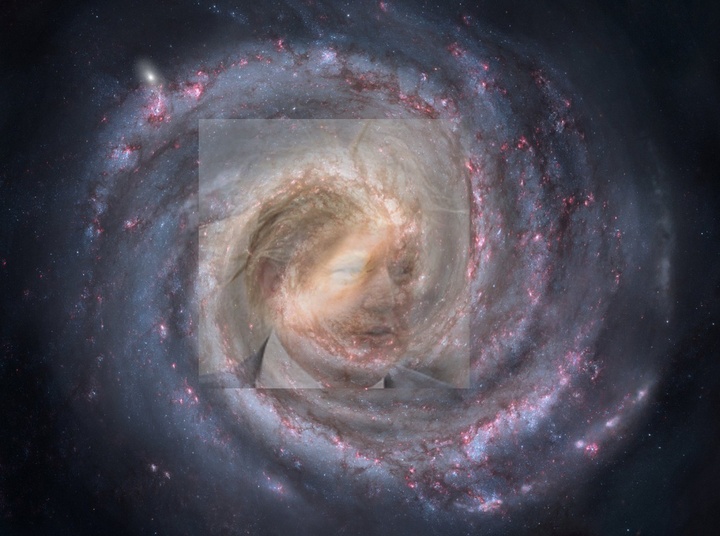
We
elected Donald Trump for the same reason we don’t find alien
civilizations in our galaxy: All technologically smart civilizations
embody the seeds of their own destruction.
(To save us all a lot of time and argument, anyone reading this who manages to convince themselves that last month’s election represents a more hopeful future for mankind, please leave the room now. This is for those of us who are currently scared shitless.)
Intelligence and technical ability go hand-in-hand with ambition and aggression. We didn’t get to where we are today by being compassionate, passive or accepting of the status quo; we got here by conquest — of our neighbors, our environment, our limitations — and by our unwillingness to accept life “as is.” We (our ancestors, mostly, but you’ll find examples in today’s headlines) raped and destroyed and overpowered and out-competed everything and everyone who was in the way of “progress.” Which ultimately means that big brains strapped onto tool-using bodies are ultimately screwed.
Given the fact that the past century has seen: two world wars, not to mention Korea, Vietnam, Iraq, Afghanistan; the Holocaust, Biafra, Rwanda; creation of weapons of mass destruction to the tune of some 2,000 hair-trigger nuclear ballistic missiles in the U.S alone (with another 12 nations possessing nukes); ongoing injection of CO2 into our increasingly warm atmosphere (the concentration is now higher than anytime in the past 20 million years); 30 percent increase in ocean acidification; annual species loss of between 0.01 and 0.1% (about 5,000 times the natural extinction rate); insatiable acquisitiveness … given all that, you’d have to be a stoned Pollyanna to believe we’re not on the path to self-destruction.
By electing an old white guy who lacks any sense of restraint or kindness or understanding of science (check his cabinet picks if you disagree) to be the most powerful man in the world is merely an extension of this innate self-destructive urge. Extrapolating this thesis to the galaxy (why not, since we’ve thrown all the other rules out the window?), we don’t find signs of intelligent life Out There because they’ve all done themselves in before they couldn’t figure out how to pacify such primeval urges.
In 1961, astronomer Frank Drake conceived what came to be known as the “Drake Equation,” a cavalier attempt to estimate the number of communicative intelligent civilizations in our galaxy (“communicative” meaning civilizations that release signals that we can detect, usually taken as the ability to built radio telescopes). Multiplying out a series of fractions by the rate of star formation in the Milky Way (often assumed as one per year), then multiplying that number by “L” (see below), gives you the number. The fractions are: stars that have planets; of those planets, the ones can potentially support life; of those, planets that actually develop life; of those, planets on which “intelligent, civilized life” has developed; and of those civilizations, those that transmit detectable signals into space. Times L, the length of time over which such civilizations release such signals.
And there’s the rub. Drake made the assumption — one that I’m also making in this column — that the days of any intelligent civilization are numbered. In our case, the genes that allow us to build smart phones, jet aircraft, hip replacements and radio telescopes are the same ones that have given us poison gas, nuclear weapons, overpopulation, environmental excesses and, well, last month’s election result. Pick your own number for L: 100 … 1000 … 10,000 years. In any case, in this view, it’s finite, progress being non-sustainable. (For what it’s worth, skeptic Michael Shermer came up with L = 420 years, based on the rise and fall of 60 civilizations here on Earth.)
Which would explain the “Fermi Paradox” which asks, “If intelligent alien beings are common, why don’t we see any sign of them?” Answer: “Because they were all too smart for their own good; they evolved to the point of killing themselves off.”
The situation is analogous to cancer. One doesn’t “catch” cancer, the same way one might catch an STD or influenza; cancer comes from within. Every second, some four million cells in each of our bodies create daughter cells. Most are perfect copies, and of the inevitable imperfect ones, the vast majority are benign or non-viable. But every so often a cell (it just takes one!) emerges that has the edge on its neighbors, and does what all viable life does: it multiplies. If not attacked by the body’s white blood cells (and why should that happen? — the new cells are hardly alien!), a tumor is born. Conquer heart disease, strokes and all the rest, and you’re still left with cancer. Because of evolution, cancer is part of the package; we carry the seeds of our own destruction.
I don’t think I need to push the cancer/future of our species analogy any further. One way or another we are, as I say, screwed. Have a nice day!
CLICK TO MANAGE